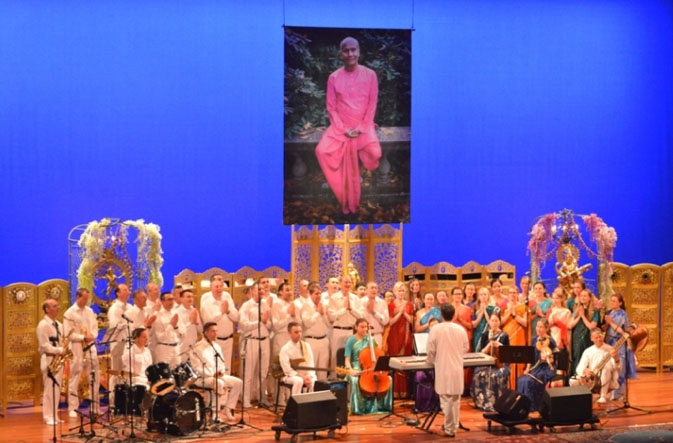Simplicitas Cordis is a recording of 45 poems of Sri Chinmoy translated into Latin by Ralph Lazzaro and set to music by a Benedictine monk, in 1983. In this recording they are sung by an international group comprising students of Sri Chinmoy.
Last modified February 4, 2012
Simplicitas Cordis is a recording of 45 poems of Sri Chinmoy translated into Latin by Ralph Lazzaro and set to music by a Benedictine monk, in 1983. In this recording they are sung by an international group comprising students of Sri Chinmoy.

“These simply must be put into Latin” was the immediate and enthusiastic reaction of Ralph Lazzaro, Director of Language Studies at the Harvard Divinity School, upon receiving a book of poems by Sri Chinmoy. But why a Latin translation of poems written in English by a Bengali-born philosopher? “The poems are beautiful in their simplicity and profound in their significance,” Mr. Lazzaro later elaborated. “Latin is a concise language, and it seems a natural medium in which to convey the directness of Sri Chinmoy’s poetry.”
Sri Chinmoy had a longstanding connection with the Harvard Divinity School, beginning with a lecture on Vedanta in 1969 on the anniversary of a similar lecture in 1896 by Swami Vivekananda, who first offered the spiritual wisdom of the East to audiences in the New World. Sri Chinmoy returned to give a series of seven lectures at the Divinity School in 1975, and in 1978 he gave a complete collection of his first 300 published works to its library. He returned many times to give a lectures or concerts at Harvard, for he says that the university symbolizes the achievements of “the Western mind and the Eastern heart.”
Several of the Latin poems in the book Simplicitas cordis were set to traditional Gregorian chant by a priest from a monastery which specializes in the study and performance of Gregorian chant.
1.
Offering worship to You,
I am so happy My Lord.
I am also happy
Because this happiness of mine
Nobody can steal.
Adorare Te devote
Me laetificat, Domine.
Gaudeo gaudium meum
Nemo a me tollet.
– Sri Chinmoy, Ten Thousand Flower-Flames, Part 5, Agni Press, 1979.
2.
God the Truth
My mind admires.
God the Love
My heart needs.
Deus Prima Veritas
Menti meae admirandus.
Deus Summa Caritas
Cordi meo anhelandus.
– Sri Chinmoy, Ten Thousand Flower-Flames, Part 20, Agni Press, 1981.
3.
O Lord, where is the Truth?
“Where your Beloved is?”
Who is my Beloved, Who?
“In whom your life is peace.”
Domine, ubi est Veritas?
“Ubi tuus Dilectus.”
Quis est meus Dilectus, quis?
“In quo est vita tua pax.”
– Sri Chinmoy, My Flute, Agni Press, 1972.
4.
My first discovery:
God cares for me.
My last discovery:
I need God.
Invento mea prima:
Deus curator mei.
Inventio mea ultima:
Indigeo Die.
– Sri Chinmoy, Ten Thousand Flower-Flames, Part 20, Agni Press, 1981.
5.
God the Teacher
Instructs me in the morning.
God the Father
Blesses me in the evening.
Deus Preaceptor
Docet me mane.
Deus Pater
Benedicit me vespere.
– Sri Chinmoy, Ten Thousand Flower-Flames, Part 41, Agni Press, 1982.
6.
To own peace
Is to own a living God.
To own a living God
Is to become another God.
Possidere pacem
Possidere est Deum vivum.
Possidere Deum vivum
Fieri est alter Deus.
– Sri Chinmoy, Transcendence-Perfection, Agni Press, 1975.
From Simplicitas Cordis: poetry of Sri Chinmoy, Agni Press 1983 – New York, ISBN 0-88497-659-9
Artist: Sri Chinmoy Centre
Name: Simplicitas Cordis
Composer: Sri Chinmoy,
Release year: 2010
Duration: 0:06:20
Acknowledgements: Sri Chinmoy Centre
Tracks uploaded: Ashish Zubaty
Format: Advanced Audio Coding

We have 300 other pages containing uploaded tracks by Sri Chinmoy Centre. View all pages »
The content on Radio Sri Chinmoy is available to share with everybody under the terms of the Creative Commons licence. Read more »